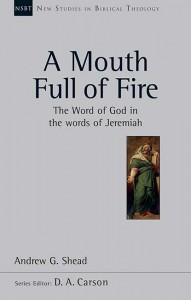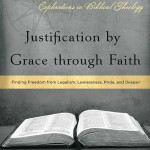 A Mouth Full of Fire: The Word of God in the Words of Jeremiah. His opening chapter which surveys the various approaches which are often referred to as “biblical theology” is very helpful in itself. He then expounds how the book of Jeremiah presents to us a theology of revelation.
A Mouth Full of Fire: The Word of God in the Words of Jeremiah. His opening chapter which surveys the various approaches which are often referred to as “biblical theology” is very helpful in itself. He then expounds how the book of Jeremiah presents to us a theology of revelation.
Here are a couple of good quotes to give you a flavor of the book:
“To read the Bible as divine address does not mean ignoring its rootedness in human language and culture, but it does mean that these human texts are read in a particular way, and with a particular attitude of humble listening, that suggests that the best readings of Scripture will not only be confessional but will take place in confessional contexts, and in prayer and by the illumination of the Holy Spirit” (37).
“Where Scripture is carefully read and obediently heard, where it is joyously sung, prayed, studied, and proclaimed, there God makes himself present in the living and transforming person of his Word, and there he fashions a forgiven people into the words by which his Word will speak to tear down this world, this city of death, and build the eternal city of God” (290).

 A good warning from the 5th Century:
A good warning from the 5th Century: